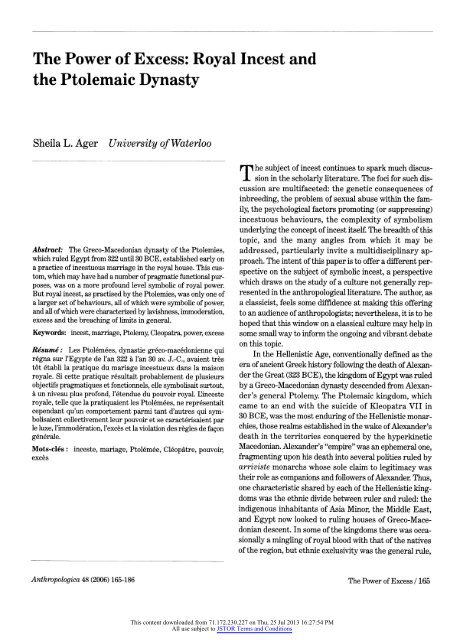The Power of Excess: Royal Incest and the Ptolemaic Dynasty
The Power of Excess: Royal Incest and the Ptolemaic Dynasty
The Power of Excess: Royal Incest and the Ptolemaic Dynasty
You also want an ePaper? Increase the reach of your titles
YUMPU automatically turns print PDFs into web optimized ePapers that Google loves.
<strong>The</strong> <strong>Power</strong> <strong>of</strong> <strong>Excess</strong>: <strong>Royal</strong> <strong>Incest</strong> <strong>and</strong><br />
<strong>the</strong> <strong>Ptolemaic</strong><br />
<strong>Dynasty</strong><br />
Sheila L. Ager<br />
University <strong>of</strong> Waterloo<br />
Abstract: <strong>The</strong> Greco-Macedonian dynasty <strong>of</strong> <strong>the</strong> Ptolemies,<br />
which ruled Egypt from 322 until 30 BCE, established early on<br />
a practice <strong>of</strong> incestuous marriage in <strong>the</strong> royal house. This cus<br />
tom, which may have had a number <strong>of</strong> pragmatic functional pur<br />
poses, was on a more<br />
pr<strong>of</strong>ound level symbolic <strong>of</strong> royal power.<br />
But royal incest, as practised by <strong>the</strong> Ptolemies, was only one <strong>of</strong><br />
a larger set <strong>of</strong> behaviours, all <strong>of</strong> which were symbolic <strong>of</strong> power,<br />
<strong>and</strong> all <strong>of</strong> which were characterized by lavishness, immoderation,<br />
excess <strong>and</strong> <strong>the</strong> breaching <strong>of</strong> limits in general.<br />
Keywords: incest, marriage, Ptolemy, Cleopatra, power, excess<br />
Resume: Les Ptolemees, dynastie greco-macedonienne qui<br />
regna sur l'Egypte de l'an 322 a l'an 30 av. J.-C, avaient tres<br />
tot etabli la pratique du mariage incestueux dans la maison<br />
royale. Si cette pratique resultait probablement de plusieurs<br />
objectifs pragmatiques et fonctionnels, elle symbolisait surtout,<br />
a un niveau plus pr<strong>of</strong>ond, l'etendue du pouvoir royal. Einceste<br />
royale, telle que la pratiquaient les Ptolemees, ne representait<br />
cependant qu'un comportement parmi tant d'autres qui sym<br />
bolisaient collectivement leur pouvoir et se caracterisaient par<br />
le luxe, l'immoderation, l'exces et la violation des regies de facon<br />
generate.<br />
Mots-cles :<br />
exces<br />
inceste, mariage, Ptolemee, Cleopatre, pouvoir,<br />
subject <strong>of</strong> incest continues to spark much discus<br />
<strong>The</strong><br />
sion in <strong>the</strong> scholarly literature. <strong>The</strong> foci for such dis<br />
cussion are multifaceted: <strong>the</strong> genetic consequences <strong>of</strong><br />
inbreeding, <strong>the</strong> problem <strong>of</strong> sexual abuse within <strong>the</strong> fam<br />
ily, <strong>the</strong> psychological factors promoting (or suppressing)<br />
incestuous behaviours, <strong>the</strong> complexity <strong>of</strong> symbolism<br />
underlying <strong>the</strong> concept <strong>of</strong> incest itself. <strong>The</strong> breadth <strong>of</strong> this<br />
topic, <strong>and</strong> <strong>the</strong> many angles from which it may be<br />
addressed, particularly invite a multidisciplinary ap<br />
proach. <strong>The</strong> intent <strong>of</strong> this paper is to <strong>of</strong>fer a different per<br />
spective on <strong>the</strong> subject <strong>of</strong> symbolic incest, a perspective<br />
which draws on <strong>the</strong> study <strong>of</strong> a culture not generally rep<br />
resented in <strong>the</strong> anthropological literature. <strong>The</strong> author, as<br />
a classicist, feels some diffidence at making this <strong>of</strong>fering<br />
to an audience <strong>of</strong> anthropologists; never<strong>the</strong>less, it is to be<br />
hoped that this window on a classical culture may help in<br />
some small way to inform <strong>the</strong> ongoing <strong>and</strong> vibrant debate<br />
on this topic.<br />
In <strong>the</strong> Hellenistic Age, conventionally defined as <strong>the</strong><br />
era <strong>of</strong> ancient Greek history following <strong>the</strong> death <strong>of</strong> Alexan<br />
der <strong>the</strong> Great (323 BCE), <strong>the</strong> kingdom <strong>of</strong> Egypt was ruled<br />
by a Greco-Macedonian dynasty descended from Alexan<br />
der's general Ptolemy. <strong>The</strong> <strong>Ptolemaic</strong> kingdom, which<br />
came to an end with <strong>the</strong> suicide <strong>of</strong> Kleopatra VII in<br />
30 BCE, was <strong>the</strong> most enduring <strong>of</strong> <strong>the</strong> Hellenistic monar<br />
chies, those realms established in <strong>the</strong> wake <strong>of</strong> Alex<strong>and</strong>er's<br />
death in <strong>the</strong> territories conquered by <strong>the</strong> hyperkinetic<br />
Macedonian. Alex<strong>and</strong>er's "empire" was an ephemeral one,<br />
fragmenting upon his death into several polities ruled by<br />
arriviste monarchs whose sole claim to legitimacy<br />
was<br />
<strong>the</strong>ir role as companions <strong>and</strong> followers <strong>of</strong> Alex<strong>and</strong>er. Thus,<br />
one characteristic shared by each <strong>of</strong> <strong>the</strong> Hellenistic king<br />
doms was <strong>the</strong> ethnic divide between ruler <strong>and</strong> ruled: <strong>the</strong><br />
indigenous inhabitants <strong>of</strong> Asia Minor, <strong>the</strong> Middle East,<br />
<strong>and</strong> Egypt now looked to ruling houses <strong>of</strong> Greco-Mace<br />
donian descent. In some <strong>of</strong> <strong>the</strong> kingdoms <strong>the</strong>re was occa<br />
sionally a mingling <strong>of</strong> royal blood with that <strong>of</strong> <strong>the</strong> natives<br />
<strong>of</strong> <strong>the</strong> region, but ethnic exclusivity was <strong>the</strong> general rule,<br />
Anthropologica 48 (2006) 165-186 <strong>The</strong> <strong>Power</strong> <strong>of</strong> <strong>Excess</strong> /165<br />
This content downloaded from 71.172.230.227 on Thu, 25 Jul 2013 16:27:54 PM<br />
All use subject to JSTOR Terms <strong>and</strong> Conditions
















